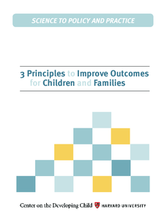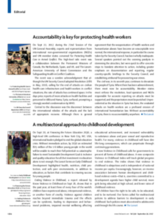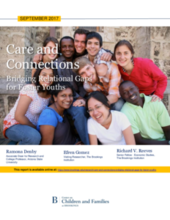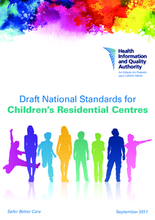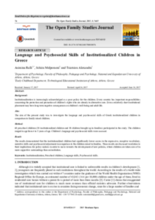Displaying 251 - 260 of 496
This report from the the Center on the Developing Child at Harvard University in the United States argues that, to be maximally effective, policies and services should: (1) Support responsive relationships for children and adults, (2) Strengthen core life skills, and (3) Reduce sources of stress in the lives of children and families.
This editorial by The Lancet draws connections between early childhood development, education and childhood violence, illustrating the need for early and cross-sectoral investments in children.
This report explores the challenges of implementing and evaluating relationship-based interventions for young people with experience in the U.S. foster care system and presents recommendations for both practitioners and researchers for successful implementation and evaluation in the future.
This study investigated Portuguese adolescent adoptees' perceptions of their attachment relationships with their adopted parents compared to adolescents living with biological parents and adolescents living in residential care.
This article utilizes data from the Bucharest Early Intervention Project to examine the neural indices of cognitive control and visual attention biases in children who have been institutionalized in order to understand how they influence the emergence of psychopathology in children with experience in institutional care.
This paper describes and analyzes the implementation of trauma and evidence-informed interventions in three federally-funded statewide demonstration sites in different regional contexts throughout the United States.
Ireland's Health Information and Standards Directorate has launched a public consultation on the Draft National Standards on Children's Residential Care. Once finalized, the Standards will provide a framework for the ongoing development of child-centred and effective services for children living in residential care centres. This document contains the preceding Draft Standards, eligible for feedback through 02 November 2017.
This report presents the findings from a secondary analysis of data from a comprehensive intervention in three baby homes in St. Petersburg, Russian Federation. The analysis examined whether caregiver-child interaction quality, number of caregiver transitions, and group size mediated the impact of intervention on children's attachment behaviors and physical growth.
This study investigated the language and psychosocial skills of pre-school aged Greek institutionalized children in comparison to Greek children of the same age raised in a family environment.
This secondary analysis, based off data collected in 1999 by the Survey on Child Abuse in Residential Care Institutions in Romania, investiged the prevalence of growth stunting of institutionalized Romanian children and compared the prevalence of stunting between four different institutional contexts.

